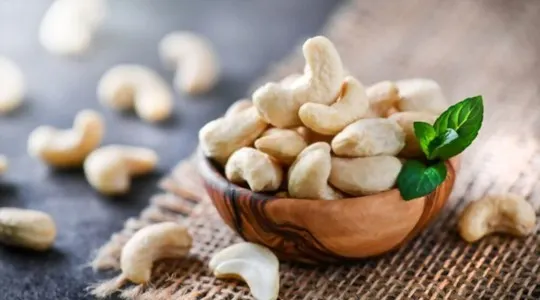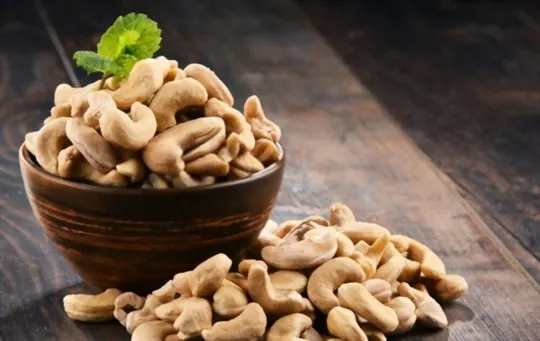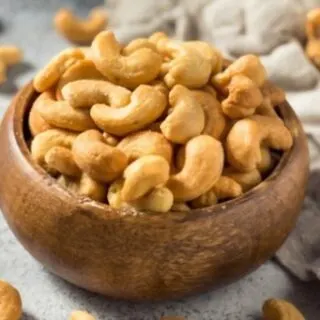Have you ever bought a can of cashews, only to find them lingering in your pantry for days on end?
Are you unsure about how long they have before spoiling or if they even go bad at all?
Well, look no further because we are here to answer all your questions regarding the shelf life of cashews!
In this blog post, we will carefully examine and demystify the mysteries surrounding this savory snack.
From determining what happens when these nuts are exposed to air or excessive heat, to understanding their nutritional benefits — by the time you’re finished reading, you will be surprised by how much there is to learn about one of our favorite side dishes.
So let’s dive right in and explore — what secrets do cashews hold behind their crunchy exterior?
What’s Cashew?

Cashew is a tree nut that is widely appreciated around the world for its flavor and its versatility in cooking.
It’s part of the Anacardiaceae family, which includes mangoes and pistachios, and its botanical name is Anacardium occidentale.
Native to northeastern Brazil, it was introduced to India by Portuguese traders in the 16th century.
The nut itself grows at the end of a fruit-like structure called a cashew apple, making Cashew one of the few delicious snacks that grows out of a fruit.
It has high levels of magnesium and iron and moderate amounts of phosphorus and could provide health benefits when consumed on a regular basis.
How to Store Cashews?
Assuming you have purchased cashews that are already shelled, the first thing you need to do is check for signs of spoilage.
These include an off-putting smell, discoloration, or mold.
If any of these are present, it’s best to discard the cashews.
Once you’ve determined that your cashews are fresh, it’s time to store them.
The ideal storage method is in an airtight container in a cool, dry place.
This could be a glass jar with a tight-fitting lid or a resealable plastic bag.
If you’re planning on storing the cashews for more than a few weeks, it’s best to keep them in the fridge.
With proper storage, cashews can last for several months.
But over time, they will start to lose their flavor and become rancid.
So if you want to enjoy the freshest possible cashews, it’s best to use them within a few weeks of purchase.
How Long Do Cashews Last?

Cashews are a popular type of tree nut that is often used in cooking.
They have a sweet, buttery flavor that pairs well with savory dishes.
Cashews are also a good source of protein, fiber, and vitamins.
Because of their nutritional value, cashews are often considered a health food.
Cashews will last for about two years if they are stored in a cool, dry place.
If you refrigerate them, they will last for up to three years.
If you freeze them, they will last for up to four years.
The best way to store cashews is in an airtight container in the fridge or freezer.
It is important to check the expiration date on the package before eating any cashews that have been stored for more than a year.
If the nuts smell rancid or have mold on them, it is best to discard them.
Can You Freeze Cashews?
Yes, you can freeze cashews. In fact, freezing them is a great way to extend their shelf life.
Cashews are a versatile nut that can be used in sweet and savory dishes alike.
While they’re most commonly eaten on their own as a snack, they can also be added to trail mix, yogurt, oatmeal, and so much more.
When stored properly, cashews will last for up to six months in the freezer.
To freeze them, simply place them in an airtight container or bag.
Once thawed, they may not be as crisp as they were when first frozen, but they’ll still taste just as delicious.
So if you have a surplus of cashews, don’t hesitate to pop them in the freezer for later.
How to Tell If Cashews are Bad?

Cashews are a delicious, nutritious snack that can be enjoyed by people of all ages.
But like all food, they can go bad if they’re not stored properly.
Here are a few things to look for when you’re trying to tell if your cashews have gone bad:
The first thing you’ll notice is the color.
Cashews that are fresh will be a creamy white color, while cashews that have gone bad will usually have a yellow or brown tinge to them.
The second thing you’ll want to pay attention to is the texture.
Fresh cashews should be firm and have a slight give when you press on them, while bad cashews will be soft and mushy.
If you’re still not sure, the best way to tell if cashews have gone bad is to smell them.
Bad cashews will have an off-putting odor, while fresh ones should have little to no scent at all.
When in doubt, it’s always better to err on the side of caution and throw out any cashews that you’re not sure about.
So there you have it. These are just a few simple ways to tell if your cashews have gone bad.
By following these tips, you can make sure that you’re always enjoying fresh, delicious cashews.
Conclusion
We discussed the shelf life of cashews and how to tell if they’ve gone bad.
Cashews are a great source of healthy fats and protein, and can last for several months if stored properly.
However, like all nuts, they can go rancid if left out in the open or exposed to too much heat or moisture.
If you’re not sure whether your cashews are still good, it’s best to err on the side of caution and throw them out.

How Long Do Cashews Last? Do They Go Bad?
Ingredients
- Cashews
- Air-tight containers or Ziplock bags
- Labels and markers
Instructions
- Store your product in an labelled container in a cool, dark place like the pantry or fridge.
- If your food is frozen, allow it to thaw in the fridge before cooking.
- Make sure to look for signs that your food has gone bad before eating it.

Carrie is a food writer and editor with more than 15 years of experience. She has worked for some of the biggest names in the food industry, including Bon Appétit, Food & Wine, and Martha Stewart Living.
As the Editor in Chief of IntroChicago.com, Carrie oversees all of the content on the site. She also manages the team of contributing writers and editors, who help to create delicious recipes, helpful tips, and informative articles that you’ll find on the site.
A native of the Chicago area, Carrie is passionate about all things food. She loves trying new restaurants and experimenting with new recipes in her kitchen. She’s also a graduate of the Culinary Institute of America, so she knows a thing or two about food!
